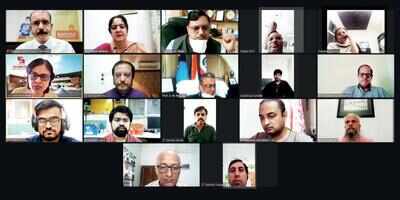
Seeking deferment of the new academic session to January 2021, Shiv Sena leader Aaditya Thackeray’s letter to the Prime Minister brings forth the impact of the Covid-laden education impasse on students of all ages. Panellists at this month’s TOI Debate — which was streamed live on Facebook — consider the potential consequences of resuming classes, and the challenges therein for administrators
The impending resumption of on-campus education throws up a variety of questions on timing, safety and modalities. The answers, panellists averred, would be different for each institution.
Only if the campus is a residential one, said Symbiosis International University pro-chancellor Vidya Yerawadekar, where students can be onboarded in a staggered manner and their mental and physical well-being ensured, should immediate resumption be considered. “Since every city has its own set of Covid-19 rules, the date of commencement of academic year would also vary accordingly,” she added.
Tuli College of Hotel Management director Urvashi Yashroy said that while classes had already commenced online, a “blended learning approach” seemed to be the way forward. “Movement into colleges should begin, but with restrictions. We can have fewer students on campus by dividing them into batches. Meanwhile, online classes should continue,” Yashroy said.
Rushing to open colleges would serve no purpose, felt Nagpur University (NU) Shikshan Manch president and former mayor Kalpana Pande. “We have to think about students from all strata of society. How will students from rural areas travel to college? Will they find a place to stay?” she said.
To sidestep this issue, Sachin Untawale, director, GH Raisoni College of Engineering, suggested that the academic session be divided into smaller terms, so that each course split could be completed online. “Autonomous institutions should identify clusters for courses in every stream, and teach them online till the time classrooms reopen physically,” Untawale said.
On whether colleges were equipped to take the responsibility of students’ safety, former NU pro vice-chancellor Mahesh Kumar Yenkie said the onus fell on the entire university, and all institutions could not provide the same level of safety. “There are over 4 lakh students in NU, who would be constantly exposed to contagious disease while travelling. It is not advisable to take that risk right now,” Yenkie said.
“Colleges can be reopened when it is safe, and we can work extra hours to make up for the lost time,” he added.
Bringing in the students’ perspective on this, Sanketraja Soinde — who is in the final year of his MBA — said while some are self-starters, majority of the students need to be motivated for studies. “Online classes can suffice for the former, but the latter need in-person guidance, and colleges need to be opened again for them,” Soinde added.
Academics did not entirely agree with this hypothesis. Quoting a media report, Indira Gandhi National University (IGNOU) regional director P Sivaswaroop stated that 85.4% students in Telangana between Std III and X attended classes through TV, which showed their “readiness to utilize various means” to complete their education. “We can also adopt the concept of inverted learning, where students do their classwork at home and homework in class. The idea of online learning should be to maximize interaction,” he added.
Yerawadekar said universities must prepare for bringing students to campuses a few months down the line. “Once the students are there, we need to ensure everything is in place. We will have to set up a system to mitigate the challenges posed by Covid-19, in the interest of students,” she added.
The discussion veered to Yuva Sena president Aaditya Thackeray’s call for shifting the academic session to January 2021. Pande was of the opinion that expert analysis was needed before jumping to make “populist announcements” on a decision as important as this. “If this is a long-term move, there must be due deliberation on it, as it affects so many students and colleges,” she said.
Yenkie, though, felt the proposal made sense as the universities following semester system were slated to commence their even semester classes in January anyway. “Abroad too, spring admissions take place in January. The system exists, we just need to make it resilient enough to absorb shocks like this pandemic,” he asserted.
Former AICTE chairman SS Mantha too found merit in Thackeray’s demand. “Getting things up and running will easily take 2-3 months, so starting in January is a good idea. Classes can be held in two shifts — the first one can cover the conventional curriculum and the second can focus on competency-based skilling,” Mantha explained.
“Those who cannot afford full fees may opt for the second shift. This will improve Maharashtra’s gross enrolment ratio (GER) too,” he added.
Stating that this academic flexibility was, however, only feasible for non-professional courses, Maharashtra Animal and Fishery Sciences University (MAFSU) vice-chancellor Ashish Paturkar drew the panel’s attention towards the “hands-on training” required in professional courses. “These courses have a fixed syllabus, and unless students complete the basic subjects, they cannot go for advanced studies in the next semester,” he explained.
Panjabrao Deshmukh Krishi Vidyapeeth (PDKV) vice-chancellor VM Bhale agreed with Paturkar, saying post-graduation students stood to lose the entire year if the course studies were not resumed soon. “Training must be given in person, keeping Covid distancing and other precautions in mind. Parents must be prepared to take some risks for the sake of their children's’ careers,” Bhale said.
Soinde highlighted the stigma among private companies with regards to jobs for the Covid-affected batch. Untawale pointed out that it was not just a matter of one batch, but of three (first, second and third years).
Nevertheless, many panellists remained optimistic. Mantha stressed on the need to adopt a student-centric approach while making any decision.
Pande said this was not the first time an unforeseen situation impacted education. “There were World Wars before this. There was the Independence movement, where lakhs quit their schools and colleges to join the struggle. Such situations have arisen before, but the education system did not collapse. If we can survive despite such setbacks, we are resilient enough,” she summed up.

Coronavirus outbreak
Trending Topics
LATEST VIDEOS
City
 Drug link in SSR case: My son wrongly framed, there are bigger names involved, says father of the accused
Drug link in SSR case: My son wrongly framed, there are bigger names involved, says father of the accused  SSR death case: Mumbai Police under lens? Central agencies to probe whether Call Data Records were leaked
SSR death case: Mumbai Police under lens? Central agencies to probe whether Call Data Records were leaked  With a new turn in SSR case, BJP leader Vishwas Sarang demands dope test for actors
With a new turn in SSR case, BJP leader Vishwas Sarang demands dope test for actors  SSR death: Imtiaz Khatri's alleged role in drug mafia-Bollywood nexus needs to be thoroughly probed, says BJP leader Ram Kadam
SSR death: Imtiaz Khatri's alleged role in drug mafia-Bollywood nexus needs to be thoroughly probed, says BJP leader Ram Kadam
More from TOI
Navbharat Times
Featured Today in Travel
Quick Links
Kerala Coronavirus Helpline NumberHaryana Coronavirus Helpline NumberUP Coronavirus Helpline NumberBareilly NewsBhopal NewsCoronavirus in DelhiCoronavirus in HyderabadCoronavirus in IndiaCoronavirus symptomsCoronavirusRajasthan Coronavirus Helpline NumberAditya ThackerayShiv SenaFire in MumbaiAP Coronavirus Helpline NumberArvind KejriwalJammu Kashmir Coronavirus Helpline NumberSrinagar encounter
Get the app



